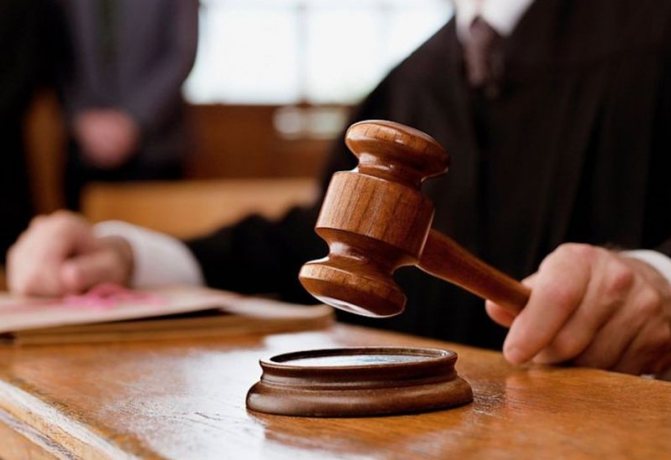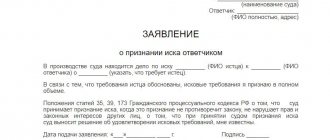Law firm Shmeleva and Partners
Arbitration cases
449
Only the defendant has the right to file a counterclaim in the arbitration court. This is directly indicated by Art. 132 Arbitration Procedure Code of the Russian Federation. None of the other parties to the dispute are given such a right. Other participants protect their interests by filing independent claims. A counterclaim to the arbitration court is aimed solely at challenging the claims of the original plaintiff.
What are the purposes of its presentation?
If the law allows, under Article 132, to file a counter-application with the Arbitration Court of the Russian Federation, then the defendant’s side willingly takes advantage of this opportunity. This will save time. The controversial legal relationship will be considered within one case.
A counterclaim always defends the defendant's position in the dispute. And this is one of the ways to declare your rights to the latter without taking them beyond the framework of one process.
The RF CA accepts this application and considers it if:
- There is a relationship with the main claim.
- Offsetting the original claim.
- This will help resolve the dispute faster.
- His satisfaction may exclude a positive decision on the main one, both in full and in part.
IMPORTANT: the claim under consideration is submitted only to 1 instance, is accepted by it for proceedings, and the process begins anew. If the judge in the proceedings has several cases with common grounds and claims that meet the criteria (the main one, met), the court is obliged, upon a petition submitted by a party to the dispute, to combine all the cases into one consideration.
When is a counterclaim filed?
A counterclaim in the arbitration process is submitted only to 1 instance during the consideration of the controversial issue, but before a decision is made on it. And also when the case is returned for consideration a second time to the court of 1st instance.
The procedure for filing a counterclaim in the arbitration process is characterized by the following features:
- Only the defendant has the right to this procedural action.
- Upon counterclaim, the defendant and plaintiff change places.
- Jurisdiction is exclusive. This means that the application is transferred to the authority considering the original claim.
In practice, it often happens that a counter-statement is confused with a response to the statement received from the defendant. A response and a counterclaim have a common goal - not agreement with the plaintiff’s demands. But the claim, which is filed in response to the main application, has more procedural weight than the application. It is focused on the offset of claims or their refutation. Only the defendant can file it under the Arbitration Procedure Code of the Russian Federation. And all persons who have an interest in this matter can raise objections on a controversial issue.

Who can counterclaim
The court may accept a counterclaim of the APC, but if it complies with Art. 125, 126 APC. The claim is submitted to the website of the Russian Federation Administration in electronic format or traditionally: in writing. The document specifies the required details:
- name of the Russian Federation AS;
- parties: plaintiff, defendant, place of residence, date, place of birth, contacts;
- name of the legal entity (if the party to the dispute is an organization): legal address, INN, OGRN, contacts;
- demands made by the defendant to the plaintiff with reference to legal acts;
- the circumstances on which the claims are based, the evidence supporting them;
- price of the statement of claim;
- calculation of the amount (collected or disputed);
- information about whether the out-of-court procedure for resolving the dispute was followed;
- information about whether measures have been taken to resolve the problem peacefully;
- information on whether the RF CA took measures to secure the claim in order to protect the property interests of the plaintiff before filing the application;
- list of documents.
In addition, the claim reflects the following information:
- No. of the case in which the main claim is being considered.
- The title of the document must contain the word “counter”.
- Justification of the conditions listed in Art. 132 APC, part 2.
The defendant's demands are based on the Arbitration Procedure Code of the Russian Federation. Otherwise, the court will not accept the application for consideration. Information contained on paper must be presented concisely and clearly. The following are not allowed in the claim:
- inaccuracies;
- errors;
- false information;
- blots.
These nuances of filing a claim can influence the court in a negative way. If there are any, the judge may refuse to accept the counter-statement.

How to serve it
Before a claim goes to trial, certain steps must be taken. They are that the defendant is not exempt from paying the state fee. This is a duty according to the rules of Art. 102 APK. The receipt is attached to the counter document.
If there is no money for the fee, then the defendant can attach to the document a request for an installment plan or deferment of the fee. The court will decide on this issue.
The claim must be accompanied by documents, the list of which is established by 126 APC. In particular:
- confirmation of the defendant’s claims (documentary only);
- a copy of the OGRN (if the party to the dispute is an entrepreneur);
- extract from the Unified State Register of Legal Entities – valid for no more than 30 days;
- copy of the charter;
- documents confirming the right to sign the application;
- a copy of the court decision on preliminary securing of the application (if it was accepted);
- papers that indicate that pre-trial order was observed.
The list of attached papers may vary, it all depends on the specific case. When the claim is ready, the papers are also ready - everything is sent to all participants in the case. The fact of delivery is documented and attached to the application.
It cannot be said that filing a counterclaim is frequent. According to statistics, a counterclaim is filed in one of 80 cases considered by the Russian Federation Arbitration Court. But official data takes into account applications that were accepted for legal proceedings. It can be concluded that a certain part of the defendant’s demands remained unanswered. And the reason for this phenomenon is the incorrect filling out of the claim, its inconsistency with the provisions of the APC.
In practice, the judge refuses to consider new claims if he understands that this will significantly delay the case. In this situation, lawyers advise sending the main claim to the court and starting a separate trial on it.
The counter-statement is submitted according to the rules of exclusive jurisdiction, in written or electronic format.
Payment of state duty
Art. 102 does not establish the amount of the state fee for filing a counter-application under the APC. The provision refers to tax legislation. In accordance with Art. 333.21 of the Tax Code of the Russian Federation, the amount of the state fee for the consideration of cases carried out by the RF AC is:
| circumstances of filing | duty |
| property claim | claim price – up to 100,000 – 4%, but not less than 2000 |
| price – from 100,000 to 200,000 – 4000+3% of the amount that is more than 100,000 | |
| from 200,000 to 1 million – 7000+2% of the amount above 2000 | |
| from 1 million to 2,000,000 – 23,000+1%, of the amount that exceeds 1,000,000 | |
| From 2 million – 33,000 + 0.5% of the amount, above 2,000,000, but not more than 200,000 |
Procedural requirements for a counterclaim: registration and filing
In terms of form and content, the counterclaim is subject to the same requirements as the main claim.
But there are also specific ones. Requirements and rules for filing a counterclaim:
- The counterclaim is prepared in writing. This can be a paper document, an electronic document, or an electronic image (scan) of a paper document. The classic option is a paper document. It is presented to the court in person, sent by mail or via courier service. Electronic documents and documents in electronic form (images) are transmitted to the court through the “My Arbitrator” service. In this case, in addition to the general procedural requirements, you need to follow a special procedure, have an electronic signature and registration in the system.
- The claim may include petitions to secure stated claims, to obtain or provide evidence, and other requests. Applications may also be submitted in the form of separate documents.
- Contents of the counterclaim (according to Article 125 of the Arbitration Procedure Code of the Russian Federation):
- name of the court;
- information about the defendant and plaintiff;
- information about third parties involved in the case;
- information about representatives of participants in the process;
- the content of the counterclaim, references to the rules and regulations that govern the claim;
- justification of the claim - the grounds for its presentation, including those specified in Part 3 of Art. 132 of the Arbitration Procedure Code of the Russian Federation, and evidence confirming such grounds;
- cost of the claim and calculation (Article 103 of the Arbitration Procedure Code of the Russian Federation);
- information on compliance with the pre-trial dispute resolution procedure, if it is mandatory;
- list of applications;
- date and signature.
https://www.youtube.com/watch?v=ytdevru
Special requirements for counterclaims are established in Part 3 of Art. 132 Arbitration Procedure Code of the Russian Federation. They relate to the subject and nature of the claim (the grounds for its filing):
- a counterclaim involves offsetting the plaintiff's claim;
- satisfaction of the counterclaim excludes satisfaction of the plaintiff’s claims in full or in some part;
- The counterclaim and the main claim are interrelated, so their joint consideration will ensure a quick and correct consideration of the entire case.
We suggest you read: How to recover a penalty from a developer without reducing interest
The specified circumstances (one or more) must be reflected in the counterclaim. It is advisable to justify them in order to draw the court’s attention to the arguments presented. If the information is not reflected, the court itself will assess the validity of the counterclaim and may not accept it.
Submission deadlines

The defendant draws up a counterclaim and submits it to the court office. He needs to wait 5 days: during this period the issue of admitting him to trial is decided. The court checks whether the application meets the requirements of Art. 127.1 of the APC, as well as the grounds for accepting a claim or refusing this action under Art. 127 APK.
After this, the grounds on which the claim is returned are analyzed. This will happen if the judge finds grounds for this, which are set out in Art. 129 APK. Either they will not be found according to Art. 132, part 3 of the APC.
If such a claim is accepted, the judge makes a ruling. It must explain why he accepted the counterclaim for consideration. The claims - initial and counter - are combined with each other, and the case is considered within the framework of one proceeding.
The disadvantage of this procedural action is that the process is delayed. If the court did not accept the claim and returned it back to the defendant, his actions can be appealed. This right of the defendant is provided for in Art. 129 APC, part 4. The appeal procedure is described in Art. 188 Arbitration Procedure Code of the Russian Federation. According to the rules of this article, the determination of the Administrative Court of the Russian Federation relating to the 1st instance is appealed within one month from the date of refusal to accept the claim.
Features of filing a counterclaim
The counterclaim has its own peculiarities. The requirements for exclusive jurisdiction apply to it. The statement itself has a number of nuances:
- The applicant is only the respondent
- In a counterclaim, the defendant is the plaintiff in the main claim.
- Jurisdiction is exclusive. This means that the claim is transferred to the court hearing the original claim.
Is it possible to present multiple claims in a counterclaim?
An analysis of judicial practice gives reason to say that a counterclaim is aimed at maintaining a balance in the procedural powers of the parties: the plaintiff and the defendant. And the possibility of filing this document is a way of protecting the rights of the defendant and a means of satisfying his independent demands.
The principle of equality of parties in the process, as well as the analysis of the legal norms that make up procedural legislation, prohibits the presentation of several claims as part of a counterclaim.

On consideration of initial and counterclaims
The defendant must confirm that the original plaintiff has an unfulfilled obligation to him, and the deadline for its fulfillment has already arrived. Let us give an example of a claim by a developer against a party under an equity participation agreement in construction for the collection of debt for purchased square meters of housing. The shareholder, in turn, believes that the construction company should pay him a penalty for the delay in putting the housing into operation and for missing the deadlines under the contract.
We invite you to familiarize yourself with: Salary of an assistant judge in an arbitration court
What might the court's decision be?
- the original plaintiff was denied satisfaction of his claims in full, and the counterclaim was satisfied;
- The plaintiff's procedural request was partially satisfied, and a sum of money was recovered from the defendant. The defendant's claim was fully admitted;
- The claim of the original plaintiff was accepted in full, but the counterclaim was rejected.
When the counterclaim is returned
Art. 132 of the APC establishes that a counter-statement is returned if the conditions provided for by the provisions of Article 129 are not met. In particular:
- lack of jurisdiction of the court case;
- the application must be considered in writ proceedings;
- the plaintiff, upon motion, returns the original claim;
- failure to eliminate the circumstances that caused the claim to be abandoned;
- failure to comply with the mandatory pre-trial dispute resolution procedure;
- the claim is not signed by the defendant, or ratified by a person who does not have the right to do so.
Preparing applications and filing a counterclaim
Before a counterclaim is submitted (sent) to court, a number of actions must be completed:
- The procedure for filing a counterclaim requires payment of a state fee. The same rules apply here as when filing the main claim (Article 102 of the Arbitration Procedure Code of the Russian Federation). A document confirming payment of the state duty must be attached to the counterclaim. If there are no funds, you can file a petition (include in the claim) for an installment plan or deferred payment - the court will make a decision when considering whether to accept the claim for consideration.
- Article 126 of the Arbitration Procedure Code of the Russian Federation establishes a list of mandatory attachments to the claim:
- documentary evidence of the validity of the stated requirements;
- a copy of the state registration certificate of the applicant (legal entity or individual entrepreneur) and an extract from the Unified State Register of Legal Entities/Unified State Register of Individual Entrepreneurs no older than 30 days;
- documents (for example, a power of attorney, a copy of the charter) that confirm the right to sign the claim - if the signatory is a representative of the applicant;
- a copy of the court decision on preliminary security - if there was such a decision;
- documents confirming the pre-trial procedure for resolving the dispute, if it is required by law or contract;
- draft agreement – if the counterclaim states compulsion to conclude an agreement.
We invite you to read: Court shortage - advice from lawyers and jurists
Leaving without consideration or termination of proceedings
The grounds are stated in Art. 148 APK:
- A similar case is pending in another court: a general court, an arbitration court.
- Failure to comply with the mandatory out-of-court procedure for resolving a dispute.
- During the establishment of facts that have legal significance, a disagreement about the law arose.
- The claim is considered within the framework of a case of insolvency of citizens or legal entities.
- The claim is not signed or ratified by a person who does not have the authority to take this action.
- A claim was filed to recover legal costs. The case is being considered under Art. 112 APK.
- Second failure of the plaintiff to appear in the courtroom. However, he did not file a motion to consider the case when he was absent, and also did not ask to postpone the court hearing.
- An agreement between the parties that their dispute will be considered in arbitration.





